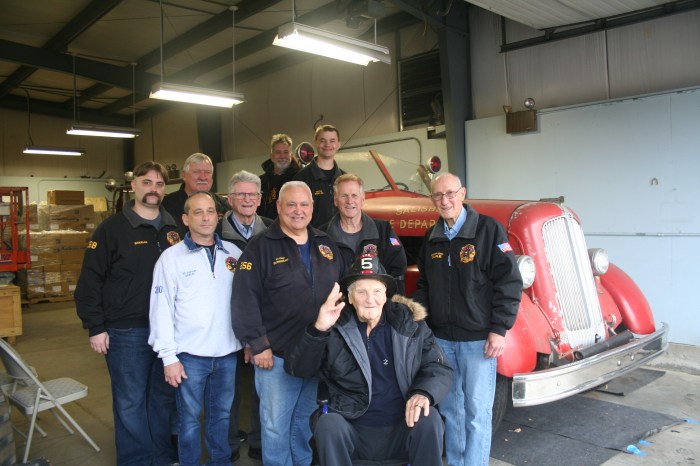Natalie Ciappa’s death led to anti-opioid initiative, awareness

For Victor Ciappa of Massapequa and his wife Doreen, the death of their daughter Natalie at age 18 is always present. Before Ciappa stepped up to the microphone at a June 22 press conference to announce a renewed push for Operation Natalia, the county’s anti-opioid initiative, County Executive Laura Curran had said, “Yesterday was the 13th anniversary of the overdose death of Natalie Ciappa. And I was speaking with Mr. Ciappa before and he said it always feels like it was yesterday.”
Regarding Natalie’s death in a Seaford garage turned party room on June 21, 2008, Ciappa said, “It could have been prevented—if we knew the signs. If we were aware that heroin was in Massapequa and all the Nassau and Suffolk towns. Now we know. And I’d like to speak directly to the parents who have the perfect child. Natalie was a perfect child. You have to open your eyes, swallow hard. Get into their business. Look at their friends. Look at their cell phone. Be invasive to save your kid’s life. It’s that important.”
He added, “Thank God for Operation Natalie because we didn’t have this weapon then—and that’s why we lost her.”
With a nod to the police brass and officers assembled behind him, he said, “These guys are my heroes.”
Speaking directly to parents he asserted, ”You people have got to do the right things—you’re parents, not friends, of your children. God Bless you.”
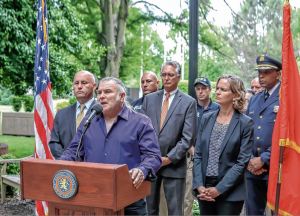
(Art Raslich | Office of the Nassau County Executive)
Soon after their daughter’s death from a heroin overdose, the Ciappas began a personal odyssey to inform parents about the resurgent scourge of heroin. Once a drug associated with inner-cities and tortured artists and musicians, it had become easily available in the suburbs and found a whole new slew of consumers.
Natalie was described in a news article from the year of her death as a “talented singer, beautiful cheerleader and above-average honors student,” a Plainedge High School graduate who was awarded a scholarship to SUNY Old Westbury.
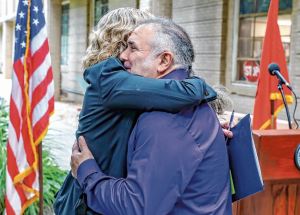
(Art Raslich | Office of the Nassau County Executive)
Operation Natalie was started in 2018, replacing an earlier program called Natalie’s Law, which was passed by both Nassau and Suffolk legislatures to create a website to map heroin possession and sales arrests. Parents could then see where the “hot spots” were in their communities.
Under Operation Natalie, according to a press release, the county aims “to decrease both fatal and non-fatal overdoses and to provide pathways to recovery.” It will focus on providing targeted communities in “hot spots” with enforcement, treatment information and education, then returning two months later to provide information on the campaign. Among communities identified as places where opioid use/sales are a concern include Farmingdale, East Meadow, Hicksville, Levittown and Massapequa.
Cops would do follow-up visits to homes where people had overdosed and survived, offering additional help.
Dismal Numbers
Police Commissioner Patrick Ryder acknowledged Ciappa, stating, “Vic and I speak quite often. It’s tough on a parent and community when we lose somebody that young, so innocent, to this horrific drug called heroin. And now with Fentanyl inside of it.”
The pandemic, the commissioner affirmed, had disrupted the successful campaign.
“We were winning the battle, We were reducing the numbers in ’17, ’18 and ’19. And then we got hit with COVID and we lost our way. The numbers drove right up,” Ryder noted.
He added, “But we’re bringing that fight back. Our education, awareness, diversion, treatment and again the aftercare. Education and awareness. It went out. We couldn’t get to the communities, we couldn’t get to the schools. We’re bringing it back. Our enforcement side of it had slowed down, because again, our interaction with the public about going out there aggressively and attacking in the war on heroin—that’s slowed down.”
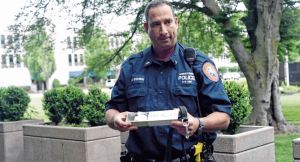
Regarding the numbers, he said, “In 2017, we hit a high. 334 non-fatal and 50 fatal overdoses. We started Operation Natalie in March 2018, our numbers at the end of 2019 were 217 non-fatal and 44 fatal overdoses. That’s a 21 percent decrease from 2017 and a 15 percent decrease in the fatal from 2017. As of today, in 2021, already my six-month non-fatal are closing in on the six-month from 2017. I’m at 281 non-fatal and 76 fatal overdoses.”
The highest figures come from the cohort between ages 21 and 30.
“Those are the people that are out of work, don’t have jobs to go to. Not going to school. Staying at home. Getting into that depression again. So we’re going to be out there again reaching to family members,” Ryder said.
As far as enforcement, the commissioner stated, “In 2017 we made 766 heroin arrests. In 2020, 294. The enforcement dropped, again because of COVID. The overdoses went up, so the product was still on the street.”
Similarly, Narcan applications, which revive victims of overdoses, went from 746 in 2017 to 300 so far this year. The calls for Narcan should increase with overdoses spikes, he noted, but “we’re not getting the calls.”
Ryder also observed that the department’s “Too Good for Drugs” program, given in 48 of 56 school districts, was also cut back significantly thanks to COVID, as many schools were closed to in-person learning or did not allow outside visitors.
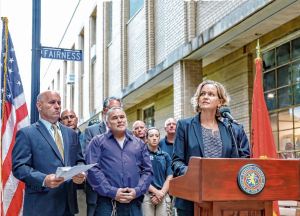
(Art Raslich | Office of the Nassau County Executive)
Curran announced that each precinct would add a problem-oriented policing (POP) officer, bringing the total to four.
According to Ryder, “The POP cops are out there working with the community, working with our narcotics guys, and trying to get the message out there and educate the public.”
The press conference also featured a demonstration starring “Moose,” a K-9 with handler Robert Cohen, who sniffed out a container of cocaine.
“As you know, marijuana has been legalized in the state of New York,” Ryder said. “That’s a problem for us—our dogs were trained to sniff marijuana. Now our dogs are working on sniffing just cocaine and heroin.”
“I’m grateful for the work of this wonderful police department and our district attorney’s office and all of our treatment providers and [others], who are in this fight together,” Curran said. “To make sure we are saving our young people, saving anyone who has fallen into the clutches through no fault of their own. We all have family who have been affected by this. Loved ones who have been affected by this. But this doesn’t mean we are going to accept it. We’re going to do everything we can to save more people.”
She added, “I want to thank Mr. Ciappa for being here today. I know it’s not easy to talk about this. But he has taken his experience and with a lot of courage and bravery has—I have no doubt—saved lives. So I want to thank him for that.”



